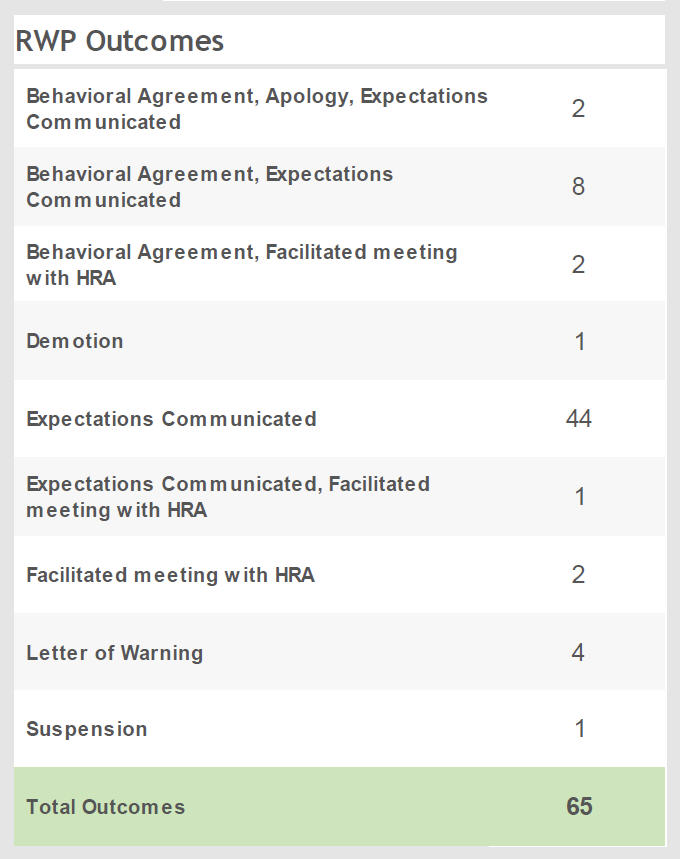What can we learn from your bullying concerns?
By now it is clear that the no-bully support model has increased reporting across VCH with 280 new requests for help received! But what can we learn from these concerns and what can staff, managers and physicians do to prevent workplace bullying, harassment and disrespectful conduct?
Common outcomes/actions
In our last VCH news update we announced that half of the no-bully concerns referred to HR for follow up have been resolved. Here’s a breakdown of the actions taken by HR when a staff member was found to be in violation of the Respectful Workplace policy: 
Each case is taken seriously and under the new support model, a concern is only considered ‘resolved’ once the HR Advisor has followed up with the affected parties (ten days after the mediation) to ensure the go-forward agreement is working. Should issues persist, additional support is provided at that time and staff are encouraged to contact HR as needed.
Expressing differences about clinical practice
A common concern reported to HR is the issue of expressing differences about clinical practice in a team setting without individuals feeling insulted or bullied. Expressing differences in a respectful tone/manner is not a violation of the Respectful Workplace policy. In fact, VCH values the diverse knowledge and wealth of professional experience each of you brings to provide the best care for our patients, clients and residents.
Think before you speak
Where the risk lies in violating the policy is how the difference is expressed – was it made in a dismissive tone, said without listening to the entire patient situation, or was the response an absolute generality such as “that’s just not best practice.” This can cause the discussion to shift from professional to personal and subsequently boundaries are blurred. Clinical professionals are expected to engage in discussion to respond to the various practice scenarios that come up each day, but please remember to do so in a considerate manner.
When meeting about patients as a team, establish the meeting agenda prior to starting and stay committed to it. When discussions move from the topic of patient case management to a person’s experience or investment with that patient, individual egos or pride rises and the likelihood of conflict escalates. Staying committed to the original intent of the meeting will focus the discussion on patient care and preserve a peer’s reputation within the team.
When discussing practice issues or a complex client, consider putting the subject of ground rules on the team agenda. Some options for ground rules can include:
a) listen to the whole story
b) avoid blanket statements when responding e.g. “we have always done it this way”,
c) demonstrate open body language,
d) manage non-verbal judgment (nodding ‘no’ or making inappropriate gestures),
e) commit to a collaborative discussion (win-win) and not debate (win-lose), and
f) exercise curiosity. In general, learn more information from others before deciding when to challenge or review a clinical decision.
Be part of the solution
In an effort to prevent future incidents of workplace incivility and bullying, we will continue to highlight common concerns and outcomes in VCH news – stay tuned!
You can also contribute to a respectful workplace by registering for our new workshop on CCRS: “How to deal with bullying and harassment in the workplace.”
More information on workplace bullying is available on the Employee Relations intranet site.


Paul Johnson
I wonder how many instances of bullying by managerial or higher were registered. ie: instances of bullying reported as a result of harrassment during Absenteeism meetings.
I was made aware of several instances of obvious harassment, intimidation and bullying behaviour from Managers and VCH representatives towards Nurses with regards these meetings and this seems to be an ongoing concern that not even the presence of Nursing Union represenattion seems to be able to curtail.